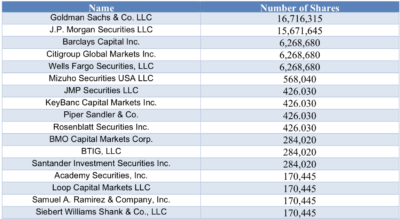Robinhood sued for misleading claims in IPO registration statement
Robinhood Markets, Inc is facing another lawsuit – this time for allegedly misleading claims in its IPO registration statement.
On December 17, 2021, Philip Golubowski filed a complaint in the California Northern District Court. The complaint, seen by FX News Group, targets Robinhood, its senior management (including Vlad Tenev), as well as the underwriters of Robinhood’s IPO.
The plaintiff purchased shares of Robinhood’s common stock that were issued pursuant and traceable to the Registration Statement and Offering, and claims that he was damaged thereby.
He brings this federal class action under §§11, 12, and 15 of the Securities Act of 1933 (“Securities Act”) against (i) Robinhood, (ii) certain of the Company’s senior executives and directors who signed the Registration Statement, effective July 28, 2021, issued in connection with the Company’s initial public offering, and (iii) the underwriters of the Offering.
The plaintiff alleges that the Registration Statement and Prospectus (filed with the SEC on July 1, 2021 and July 30, 2021, respectively), including all amendments thereto, contained materially incorrect or misleading statements and/or omitted material information that was required by law to be disclosed. The plaintiff claims that the defendants are each strictly liable for such misstatements and omissions therefrom (subject only to their ability to establish a “due diligence” affirmative defense) and as so liable in their capacities as signers of the Registration Statement and/or as an issuer, statutory seller, and/or offeror of the shares sold pursuant to the Offering.

On or about July 30, 2021, Robinhood conducted its IPO, offering 55 million shares of its common stock to the public at a price of $38 per share (the “Offering Price”) for anticipated proceeds of over $2 billion.
The plaintiff notes that, according to the Offering Documents, Robinhood is a “safety-first company” with a “radical customer focus.” It claims to be committed to: (1) “quality execution,” supposedly “performing regular and rigorous reviews of the execution quality [ ] customers receive;” (2) maintaining “high security standards” to keep customers’ accounts safe; and (3) providing “dedicated support,” to customers to resolve their issues swiftly.
Further, according to the Offering Documents, these commitments, its “fresh, people-centric approach,” and “delightful, engaging customer experience,” has led Robinhood to build “deep, loyal customer relationships” and has positioned the Company well to “continue attracting new people to [the] platform” and “accelerate [ ] growth.”
The plaintiff argues that these representations were materially inaccurate, misleading, and/or incomplete because they failed to disclose that, at the time of the IPO, Robinhood’s revenue growth was experiencing a major reversal, with transaction-based revenues from cryptocurrency trading serving only as a short-term, transitory injection, masking what was actually stagnating growth.
In addition, the Company’s “significant investments” in enhancing the reliability and scalability of its platform were patently inadequate and/or defective, exposing Robinhood to worsening service-level disruptions and security breaches, particularly as the Company scaled its services to a larger user base, Golubowski says.
As these facts emerged after the Offering, the company’s shares fell sharply. By the commencement of this action, Robinhood’s shares traded as low as $17.08 per share, representing a decline of over 55% from the Offering Price.
Via this lawsuit, the plaintiff, on behalf of himself and other members of the Class, who also acquired Robinhood’s shares pursuant and traceable to the Offering, now seeks to obtain a recovery for the damages suffered as a result of Defendants’ violations of the Securities Act.




